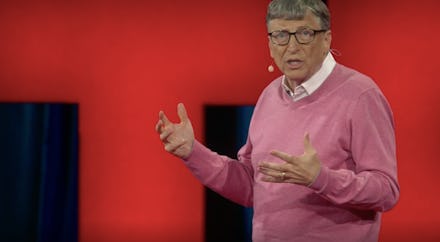Bill Gates predicted a "highly infectious virus" was coming 5 years ago

As the Ebola epidemic persisted in West Africa in 2015, Bill Gates delivered a TED Talk that urged greater preparedness for the next epidemic. His words have proven wildly prescient in 2020, with his predictions of an even more dangerous virus, and the consequences of a sluggish response, coming to fruition amid the novel coronavirus pandemic.
“If anything kills over 10 million people in the next few decades, it's most likely to be a highly infectious virus rather than a war,” Gates said in the beginning of his talk. “But we've actually invested very little in a system to stop an epidemic. We're not ready for the next epidemic.” He went on to describe the lack of epidemiologists “ready to go [to West Africa]” to assess Ebola and its spread, how it was being diagnosed, or which treatment approaches should be used.
“The failure to prepare could allow the next epidemic to be dramatically more devastating than Ebola,” which affected primarily Sierra Leone, Guinea, and Liberia, Gates said. He cited reasons why the epidemic didn’t spread further — including the nature of the virus, which can’t be spread through the air and renders people so sick, they become bedridden; and the fact that it didn’t enter urban areas.
“Next time, we might not be so lucky,” he said. “You can have a virus where people feel well enough while they're infectious that they get on a plane or they go to a market.”
Indeed, the novel coronavirus seems to spread more easily then Ebola, per STAT. While Ebola is transmitted via contact with the bodily fluids of an infected person, you can contract the novel coronavirus simply from an infected person’s coughs or sneezes, or from close contact with them. STAT also reports that novel coronavirus can be airborne for a few seconds within respiratory droplets, although conflicting preliminary evidence suggests it can persist in the air for longer.
Novel coronavirus disease, COVID-19, has also been detected in a number of urban areas around the globe. The scenario Gates described of asymptomatic people unwittingly spreading the disease in crowded areas isn’t far off the mark, either. Evidence suggests that people who show little to no symptoms may be playing a bigger role in spreading COVID-19 than initially thought, CNN reports. And according to Reuters, clusters of cases at a church in Daegu in South Korea and a hospital in a neighboring county may be linked to an infected individual who traveled to and around these locations.
As far as preparedness, not a whole lot has changed since Gates’ TED Talk. Some countries, like Taiwan and Singapore, got a handle on COVID-19 fairly early, avoiding huge outbreaks, while others, like Iran, Italy, and the US, did not, as Mic reported last week. Although the Obama administration set up a National Security Council directorate during the West African Ebola epidemic that was supposed to be responsible for preparing for the next pandemic, the Trump administration dissolved it in 2018, the Associated Press reports. Former Obama administration officials argue that the current administration could’ve responded faster had the directorate stayed in place.
“I think if we’d had a unit and dedicated professionals looking at this issue, gaming out scenarios well before ... we might have identified some of these testing issues,” Lisa Monaco, President Obama’s homeland security adviser, said at a coronavirus forum, according to the AP. “There would have been folks sounding the alarm in December when we saw this coming out of China, saying ’Hey, what do we need to be doing here in this country to address it?”
Instead, as Ashish Jha, the director of the Harvard Global Health Institute, told NPR, the lag in testing capacity in the US has prevented us from identifying and isolating every single infected person. Since we don’t know who all these individuals are, they’ll probably continue to spread the disease.
Toward the end of his TED Talk, Gates called for preparing for the next epidemic as we would prepare for war, pairing medical professionals with the military, tapping into their ability to respond rapidly — a sentiment echoed by former Vice President Joe Biden at the Democratic presidential debate on Sunday, when he said he would “call out the military” to respond to the pandemic, The Hill reports.
Gates said he didn’t know exactly how much it would cost to fund a pandemic preparedness team, but predicted it would “very modest compared to the potential harm,” both financially and in terms of loss of human life. Already, signs point to the pandemic triggering a recession, per CNBC, and CNN reports that COVID-19 has killed more than 6,500 people worldwide as of March 16, not far from the Ebola death count of 10,000 cited by Gates. While it may be too late for many countries to get ahead of COVID-19, hopefully heeding his call for preparedness could prevent it from spreading even further.